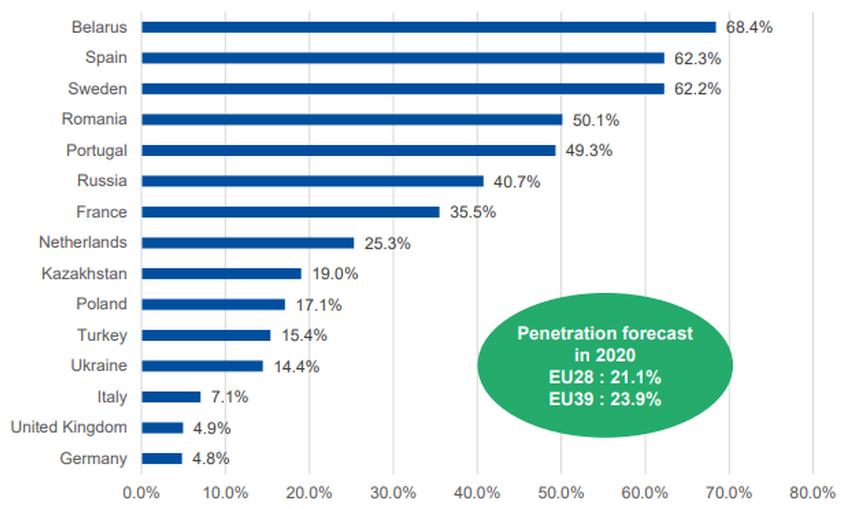Belarus ranked second in the European rating in terms of fiber-optic communication line penetration in 2019 and topped the TOP-15 countries in the 2020 forecast survey
The Republic of Belarus took the second place in the rating of European countries in terms of the penetration of fiber-optic communication lines in households as of September 2019 and became the leader in the forecast rating for 2020. This is evidenced by the results of survey on the status of FTTH/B (Fiber-to-the-home/building), carried out by the independent company Idate for the FTTH Council Europe.
The first analysis was conducted in 39 countries. The Republic of Belarus with an FTTH/B penetration rate of 62.8% ranked the second, losing only to Iceland with an indicator of 65.9%. Sweden closes the top three whith a penetration rate of 56.8%. The TOP-10 also includes Spain (54.3%), Latvia (53.9%), Lithuania (48.2%), Romania (45.6%), Portugal (42.1%), Norway (39,8%), Russia (37.3%). Our closest neighbors Ukraine and Poland have indicators of 11.5% and 6.5%, respectively.
The rating shows that in eight European countries, FTTH/B penetration is less than 10%: Ireland (7.9%), Poland (6.5%), Italy (4.1%), Croatia (3.4%), Germany (3.3%), Great Britain (2.8%), Serbia (2.3%), Austria (1.9%).
The European FTTH analysis includes countries with more than 200 thousand households with at least 1 percent use FTTH/B services (with the exception of Iceland, which has not reached 200 thousand households).
The FTTH Council also provided a forecast survey of the European FTTH/B markets for 2020. This is an updated version of the rating after COVID-19 hit Europe in the second quarter. The survey was conducted in 15 states. According to this rating, the Republic of Belarus topped the TOP-15 countries in terms of FTTH/B penetration in households.
Our country has become a leader with a penetration rate of 68.4%. The top five also includes Spain (62.3%), Sweden (62.2%), Romania (50.1%), Portugal (49.3%). Next come Russia (40.7%), France (35.5%), the Netherlands (25.3%), Kazakhstan (19.0), Poland (17.1%), Turkey (15.4%), Ukraine (14.4%). Italy (7.1%), Great Britain (4.9%) and Germany (4.8%) are at the bottom of the rating.
2020 FORECASTS

Source: IDATE for the FTTH Council Europe
The Republican Unitary Enterprise “Beltelecom” makes a significant contribution to the achievement of high positions of our country in the European rating. The development of FTTH networks using GPON technology is a strategic direction of the enterprise. A large-scale reconstruction of communication networks began in 2011. And already in 2019, Beltelecom completed the construction of fiber-optic communication lines throughout the apartment urban residential area. At present, the main efforts are directed to the construction of a fiber-optic distribution network in the detached houses area, primarily in regional centers and cities of economic growth with more than 80 thousand inhabitants, taking into account the demand for high-speed communication services.
All settlements with a hundred or more households have a fiber-optic access. Fiber-optic communication lines are also provided to over 56% of settlements with the number of households from 50 to 100. Work in this direction continues.
The advantages of a modern network are, first of all, the speed and quality of services. If Internet access speed via copper line, as a rule, did not exceed 10 Mbps, then via fiber optic line subscribers can already get up to 200 Mbps, and higher speeds in the future.
The FTTH Council Europe is an industry organization aimed to ensuring accessibility of ultra-high speed fiber optic networks to consumers and businesses. The Council promotes the implementation of this technology as it enables the provision of new services that improve the quality of life, improve the environment and increase the economic competitiveness of regions. More than 150 companies are members of the FTTH Council Europe.